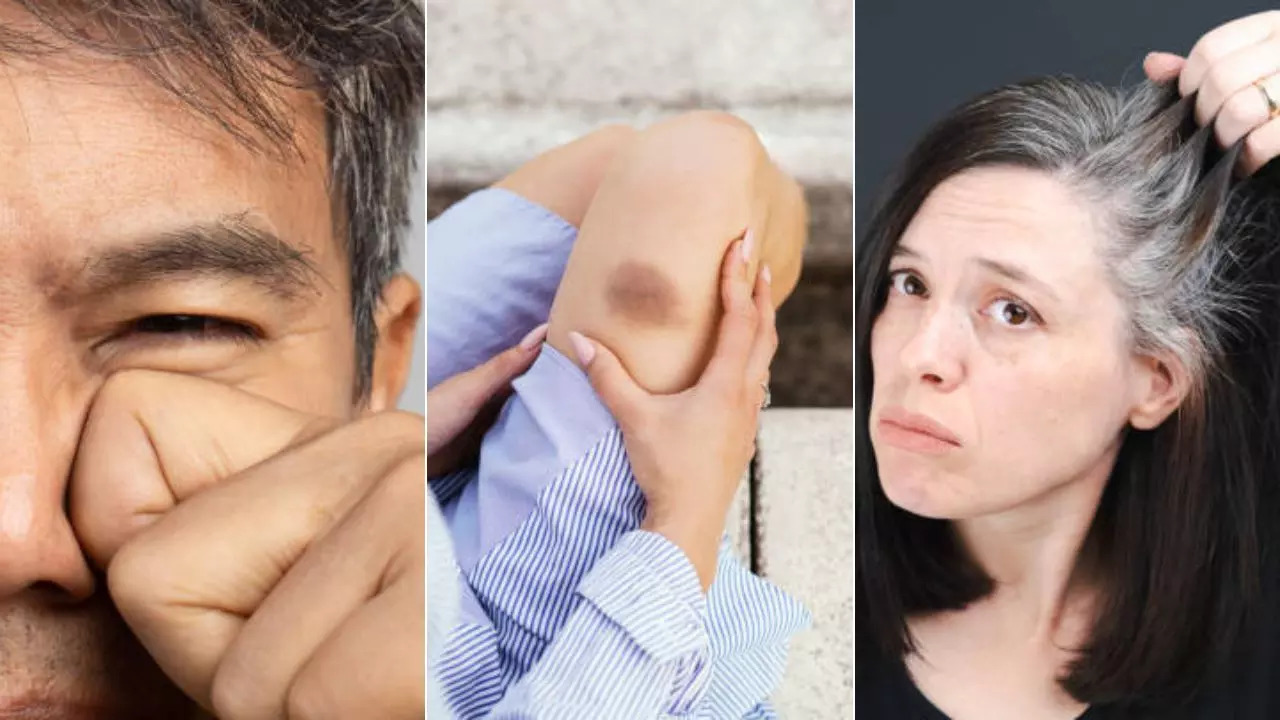Contents
-
news
-
Health
According to Harvard doctor, 5 signs that your body is deficient in nutrition
If you constantly suffer from premature graying of hair, muscle twitches, cramps, brittle nails, or cracking sounds in the joints – there is a deficiency of vital nutrients that is causing these debilitating symptoms. Read on to know what they are and how to overcome the deficiency.

Eating foods that are deficient in nutrients can cause various unpleasant symptoms or even serious adverse effects.
A balanced and nutritious diet has many health benefits. Apart from keeping your vital organs functioning, it also helps in keeping you fit. On the other hand, eating foods lacking in nutrients can cause various unpleasant symptoms or even serious adverse effects.
According to Harvard gastroenterologist and internal medicine specialist Dr. Saurabh Sethi, nutrient deficiency symptoms are your body’s way of communicating possible vitamin and mineral deficiencies. Here are some signs you should not ignore.
Common symptoms of nutrient deficiency
brittle nails
“This reflects the lack of protein and iron in your diet,” Dr Sethi said on his social media handle. Studies say that biotin, or vitamin B7, also causes brittle nails. Biotin helps your body convert food into energy.
Adults with brittle nails should include adequate amounts of protein, iron and biotin in their diet – about 30 micrograms a day, but you should always consult your doctor first. To get rid of this problem, eat lots of eggs and green vegetables like spinach, nuts, seeds, broccoli and sweet potatoes.
twitching of eyelids
“This indicates a deficiency of magnesium which is important for transmitting nerve impulses,” he said. Magnesium deficiency – which helps improve your mood, sleep, exercise performance and blood sugar regulation, also causes muscle cramps, tension in the neck and shoulders, and cardiac arrhythmias.
To overcome the deficiency of this nutrient, eat plenty of peanuts, spinach, sunflower seeds, millet, rice, beans and oatmeal. You can also consult your healthcare provider to take magnesium supplements – 250-400 mg of magnesium oxide daily to relieve muscle spasms, which can be painful and uncomfortable.
joints clicking sounds
This may be a warning sign of low levels of vitamin D, which is extremely important for the health and strength of your bones and helps improve flexibility. According to Dr. Sethi, due to deficiency of this nutrient, bones and joints become weak, due to which swelling and cracking sounds start coming. In the long run it even causes arthritis.
However, it can also be caused by calcium deficiency, which impairs the joint repair process and causes cracking sounds and joint pain. To recover from the damage, Dr. Sethi recommends taking vitamin D, calcium and omega-3 fatty acid supplements.
premature graying of hair
Premature graying of hair and hair fall are very common symptoms in 50 percent of youth nowadays. According to Dr. Sethi, “This may indicate a deficiency of vitamin B12, which is important for RBC production and oxygen transport to the hair follicles.
Meat, fish, eggs, legumes, green leafy vegetables, nuts, seeds and whole grains are good sources of vitamin B12. You can also take vitamin and mineral supplements that help you get longer and stronger hair. However, Dr. Sethi says graying of hair can also be caused by “copper deficiency,” which is responsible for melanin production that provides color to your hair. Increase the amount of copper in your diet by eating oysters, mushrooms, cashews, sunflower seeds and potatoes.
easy bruising
Sores in and around the mouth or your skin bruising easily may be partly linked to inadequate intake of certain vitamins or minerals.
“This could mean that you are deficient in vitamin C which is responsible for collagen formation. It could also mean a deficiency of vitamin K1 which helps blood clotting,” he said. You can include both vitamin C and K1 in your diet by eating papaya, citrus fruits, strawberries, bell peppers and mustard greens.
Get the latest news live on Times Now with breaking news and top headlines from around the world.


